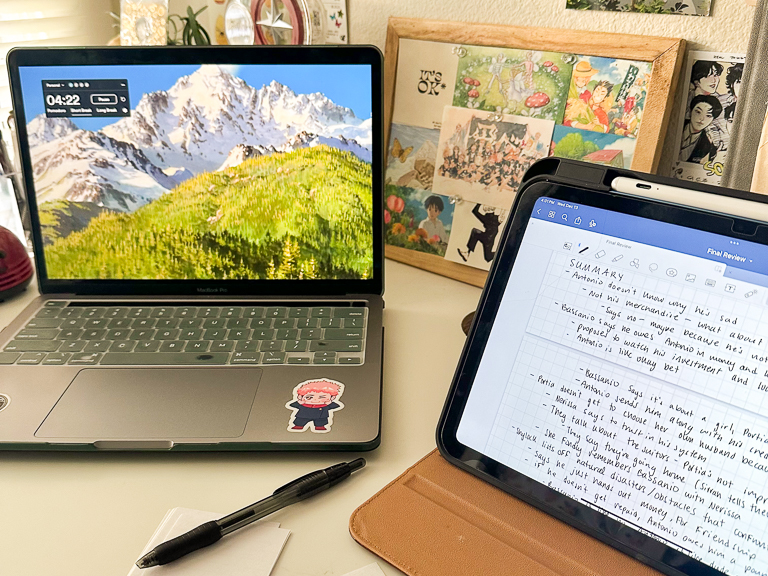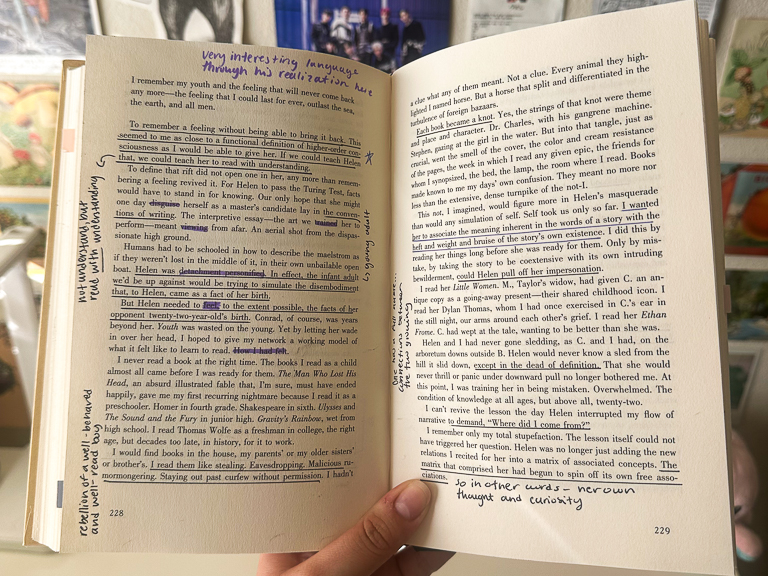
Top Study Habits After Four Years at Cal
I’ve learned a lot during my time at UC Berkeley, including how to be a successful student intern and how to build useful habits as a student. I want to share more of the best practices and habits I’ve found helpful in the academic sector as a college student, from establishing routines to learning how to read long research papers. Because I am an English major, a lot of my tips come from a writing standpoint, which has given me a unique perspective on what it means to study. I hope this advice helps you too, no matter what you’re majoring in!
Figure Out What Works for You
Even if it’s a little unconventional! This takes trial and error—be patient with yourself. Listen to your friends and peers and try out their study methods to see if anything works particularly well for you. Do you learn better when taking notes by hand, typing them, or just absorbing lectures with no notetaking? Are you a physical book reader or do you not mind digital versions? A lot of new college students have to completely rethink the way they study, so don’t be discouraged. Try new things until something feels right.
My strange writing habit is that I listen to the same albums on repeat when I write—it helps get me in the zone!
Writing Tips: This is what works best for me now, after four years of writing nonstop.
- First drafts are for spilling everything out—every thought, prospective argument. The longer the better!
- Second drafts are for rewriting and showing your professors or GSIs bits and pieces during office hours.
- Third (and often final) drafts are for implementing feedback and making sure everything is polished. Reading sentences out loud helps identify flow issues in this final stage.
At every stage, I rewrite my draft. I have the first draft open on one side of my screen, and the second side has the blank document for my second draft.

My pomodoro timer, flashcards, and review notes from when I was studying for my Shakespeare final.
Ask for Help (Really, It’s Worth It!)
Attend office hours, create peer review groups and study groups, or seek out tutoring at the Student Learning Center. For my fellow humanities students, it doesn’t matter if you only have the smallest idea of what you want to focus a paper or assignment on—it’s always helpful to run your ideas by someone else and get feedback before you start working. Professors appreciate you coming in to run ideas by them, and encourage it! I feel like I can write with more confidence after an office hours session, even when I did not have any explicit questions about my topic going in. A few of my professors built in mandatory office hours sessions into their courses for this very reason. If you’re not sure whose office hours to attend, either your GSI or professor, I’d recommend going to whoever is going to grade your paper (though attending both at some point in the semester would be ideal).
A lot of writing-based classes have peer-reviewing sessions built into them. If you’re not used to getting feedback in real time, it’s a bit of an adjustment, but peer feedback is so helpful, especially if you’re not yet ready to attend office hours. Don’t hesitate to ask your classmates if they want to swap essays. Everyone is also receiving feedback, so it’s not as awkward or embarrassing as you might think.
No one but you knows when you need help or support—so don’t be shy about reaching out. Learn to seek out the resources you need to succeed.
Reading & Skimming
This is something you’ll hear a lot across course subjects, and often from GSIs: skim what you can and read smarter, not harder. This usually means reading the introduction and conclusion, then going back and reading subheadings and maybe even the first and last sentences of every paragraph. I read a lot of different things in my major and minor, and sometimes readings were really long and boring, but I knew I had to do them. I tried to find something I loved even in the “boring” readings and let that push me through it.
When I was assigned plays, like in my Shakespeare class, I found that watching adaptations and following along with the text of the play was way easier for me than just reading the play. I was reading a lot about policy for my wildlife conservation and management class, and my GSI encouraged us to skim some readings, so I took his advice. It depends on your classes, and thankfully GSIs and professors often provide pointers on how to best approach readings depending on the discipline.
Pick and choose your battles on heavy reading weeks. I could never bring myself to skip a novel completely, but I did let a few theory or technical readings go when I needed to (meaning I only skimmed them instead of diving in and actively reading them). Part of being a busy student is learning how to prioritize, and a lot of that happens with our readings for different classes.

Annotated pages of a novel I read for my Writing Robots class.
Get Out of Your Comfort Zone
For me, getting out of my comfort zone meant taking a creative writing class (English 141: Modes of Writing) and a class on Writing AI (English 166: Writing Robots). Both were topics I had never formally written about or for before, and both had regular peer reviews built into them. If you have never experienced a seminar-style writing class before and want to improve your writing, I highly recommend enrolling in one that piques your interest!
The creative writing class pushed me to schedule that style of writing into my routine, which was very helpful in my growth. Not everyone in my assigned peer-review group was an English major—so don’t be scared to enroll in these kinds of classes if you aren’t a humanities student. The Writing Robots class was filled with data science and computer science students. My point is, don’t be afraid to take classes outside of your discipline, and don’t let anxiety hold you back from learning about topics you’re curious or passionate about. This is one of the big reasons I chose my conservation and resources studies minor, and I don’t regret it one bit!
I encourage you to try out a new class or study method while you’re at Berkeley. Remember (even if you hear it repeated a lot) that everyone is different; what works for someone else may not work for you, and that’s okay.
Melissa Mora-Gonzalez, Class of 2025, is majoring in English and minoring in conservation and resource studies.
Want More?
- Discover your new favorite study method by reading through more study-related blogs.
- Find free academic and wellness resources to help you succeed as a student.
- Everything you need to know before starting a new semester.